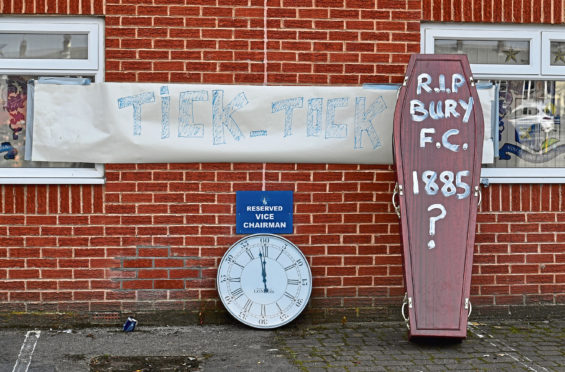
When my generation were growing up, we were taught to live within our means.
It seems to have paid off for plenty of us.
But the wisdom behind that lesson seems to be lost on football clubs in 2019 – especially in England.
Bury fans have had to watch their club being run into the ground over the last few years.
It’s a horrendous situation for folk who have paid their money, week-in, week-out, to support them over the years.
They’ll feel they have poured their hard-earned cash down the drain.
But however dreadful things are, I get annoyed when I hear people say Bury’s giant neighbours – Manchester United and Manchester City – should hand over the money required to save them.
It’s neither Manchester club’s responsibility, however rich they are.
Over many years, Bury’s owners have spent money the club couldn’t really afford while chasing a dream.
Given the cash on offer in the Championship, I understand why they did it.
But the result of their failure is clear to see.
The owners are to blame for their predicament. Of that there is there is no doubt.
Don’t believe me? Ask any one of the Scottish clubs who have been pushed to the brink of existence in recent memory.
Rangers are chief among them, but Hearts, Motherwell, Dundee and Dunfermline are in there, too.
Overspending was the root of their problems, just like Bury. And Bolton Wanderers are also struggling.
So it’s a worrying time for fans of lower-league clubs in England.
But there are two things I think need to happen to safeguard clubs’ futures.
First of all, I think lower-league English clubs need to take a leaf out of their Scottish counterparts’ book.
They need to get used to spending only what they can afford to.
If clubs in Scotland’s lower leagues can survive on tiny gate receipts and a trickle of prize money, I think those in EFL League One and Two can manage on what they receive.
Like I said earlier, I understand why these English clubs gamble.
The rewards available for a small club reaching the Championship, or, as in Bournemouth’s case, the Premiership, are enormous.
But when the result of failure is administration or liquidation, a wee bit of restraint is necessary.
Which brings me to the second thing that could safeguard clubs – and it needs the EFL to step in.
Forget about asking the Premier League for more money. They won’t offer it up. I know that for a fact.
What needs to change is the EFL’s fit-and-proper person test.
Both Bury and Bolton’s owners passed the test, as it stands. But look at the state the clubs are in.
It is time for the league to get even more serious when it comes to vetting people who want to take charge of football clubs.
Most importantly, these guys should be made to prove they have the money at their disposal that they say they do.
The days of taking charge of an ailing football club for £1 – as happened at Bury – without a guarantee of further investment should end.
Bury are the latest victims of a system that opens the door to opportunists.
It’s one that needs to be slammed shut.

Enjoy the convenience of having The Sunday Post delivered as a digital ePaper straight to your smartphone, tablet or computer.
Subscribe for only £5.49 a month and enjoy all the benefits of the printed paper as a digital replica.
Subscribe